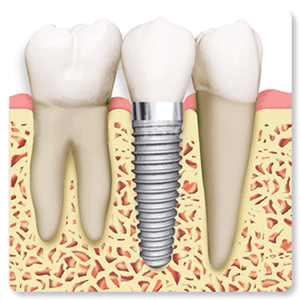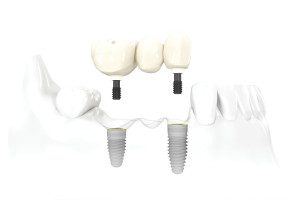What are Dental Implants?
 Dental implants are a means of replacing missing teeth. A dental implant is a small screw-type anchor made of the metal titanium that is inserted into the jawbone under local aneasthesia. Titanium is a well-documented, biocompatible material which is used as an implant material in various parts of the human body, from dental implants to hip replacement prostheses. After a healing period of a few months the normal jawbone healing response results in a functional integration with the implant surface termed as “osseointegration”. An osseointegrated dental implant is used as a solid support for crowns, bridges or dentures which are secured to the top of the implant. The new teeth look and feel similar to your natural teeth.
Dental implants are a means of replacing missing teeth. A dental implant is a small screw-type anchor made of the metal titanium that is inserted into the jawbone under local aneasthesia. Titanium is a well-documented, biocompatible material which is used as an implant material in various parts of the human body, from dental implants to hip replacement prostheses. After a healing period of a few months the normal jawbone healing response results in a functional integration with the implant surface termed as “osseointegration”. An osseointegrated dental implant is used as a solid support for crowns, bridges or dentures which are secured to the top of the implant. The new teeth look and feel similar to your natural teeth.
A single implant may be used to replace one missing tooth, or if a number of teeth are missing then multiple implants can be used. Even if all teeth in the mouth are missing, implants may still be used as an alternative to a conventional removable denture. In this case implants are used either to retain fixed bridgework, or to augment the retention of removable dentures by using special attachments that allow the denture to clip on the implants.
Professor Petridis has extensive clinical experience on the field of dental implants since 1994. He also teaches on this subject to both postgraduate students and dentists, and has authored articles and chapter textbooks as a leading world expert in the field. Professor Petridis is also a Fellow of the International Team of Implantology (ITI).

What are the advantages/benefits of implants?
Choosing dental implants as a treatment option can offer you a number of significant advantages:
Maintain anatomy
If you have missing teeth, the bone begins to shrink over time. Unhealthy bone loss can make your jaw line recede and change your facial structure. Dental implants can help prevent deterioration of the jawbone so your face retains its natural shape.
Keep your healthy teeth
When replacing one or more adjacent teeth with dental i mplants the major benefit is that they stand alone and do not require grinding down of adjacent teeth, as would be involved in some types of bridgework. This is especially important if (1): the adjacent teeth are unfilled or have only small fillings (in which case the preparation of the teeth needed for conventional bridgework can sometimes cause the nerves to die in the longer term) (2): the adjacent teeth are unsuitable to support bridgework. Therefore, our own natural healthy teeth are not compromised.
mplants the major benefit is that they stand alone and do not require grinding down of adjacent teeth, as would be involved in some types of bridgework. This is especially important if (1): the adjacent teeth are unfilled or have only small fillings (in which case the preparation of the teeth needed for conventional bridgework can sometimes cause the nerves to die in the longer term) (2): the adjacent teeth are unsuitable to support bridgework. Therefore, our own natural healthy teeth are not compromised.
Security
Securely anchored dental implants do not slip or move. This eliminates some of the key problems of dentures, including poor fit, gum irritation and pain from exposed nerves. The result is superior comfort, reliability, and freedom from embarrassment. For single or multiple missing teeth, implants can avoid the need for a removable denture. Dentures can make dental hygiene procedures more difficult and some people have trouble getting used to the bulk of denture material in the mouth. Full dentures supported with an implant-retained bar or specific attachments are much more stable than those that rely on suction or muscular control alone. This makes eating and talking easier for those who find their conventional dentures move around or are loose.
Are they suitable for everyone?
Prior to going ahead with implant treatment, an assessment needs to be made of the quality and quantity of the bone in the proposed implant sites. This will involve a clinical examination together with X-rays. While most situations will be suitable for implants, there may be those where implants are not the best option for treatment. The inital consultation appontment will enable us to provide with a summary of the best available solutions for you.
What is involved in the treatment?
The implant itself is placed into the pre-determined site in the jawbone during a minor operation, usually under local anaesthetic. A period of time, which may be up to six months, is then needed to allow the implant to integrate with the bone. After this time the implant is uncovered and a crown, made to look natural and blend in with the adjacent teeth, is made up by a dental laboratory to attach to the implant. In the case of a full denture, ball-ended attachments can be placed on implants which grip fixtures on the underside of the denture, or a metal bar is fixed to two or more implants and a full denture made with a special attachment to firmly grip the bar.
Does it hurt?
It is a surgical procedure and therefore you should expect some discomfort for a few days. The pain can be easily controlled with normal painkillers. Some stitches will be placed in the area, which are usually dissolvable. Overall you will realise that the actual procedure was ‘easier’ than what expected.
Are they expensive?
Treatment fees depend on several factors. Additional procedures might be required prior to implant placement in order to ensure there is adequate bone for the placement and to recreate all the lost tissues (gums and bone). Generally dental implants are slightly more expensive than the alternatives of bridgework or dentures, largely due to the cost of the materials used and the exacting nature of the treatment. In most of the cases, the advantages that implants offer in certain situations can make them the treatment of choice for the long term.
A detailed treatment plan with costs will be discussed at the consultation visit with Professor Petridis and he will provide a fee estimate in written.
Which is the best dental implant system?
This is a very common question asked by a number of patients looking for treatment with dental implants. Professor Lambis Petridis has posted a short article with some important information on this subject. You can access it here.
What is the success rate of this treatment?
Dental implants have now been in use for many years and can show 10-year success rates of over 95% in favourable situations. It is important to the success of implant treatment that regular monitoring is carried out and that good oral hygiene measures can be maintained.
Dental implant aftercare
Implant retained restorations must be checked regularly and must receive regular dental care as if they were normal teeth. Dental hygienist appointments and maintenance are essential as implants are susceptible to periodontal disease. Excellent plaque control and monitoring will ensure the longevity of your restorations.
Please visit the iSmile gallery for stories of patients who regained their confidence and smiles with the aid of dental implants! You may arrange for a consultation appointment so we can plan your new smile together.
As an active member of AO (Academy of Osseointegration), Professor Petridis offers advanced specialised knowledge about the science and clinical applications of implant dentistry. Learn more about dental implants and AO. Professor Petridis is also a Fellow of the International Team of Implantology (ITI) which is a global group of professionals dedicated to the advancement of teaching and research on dental implants.











